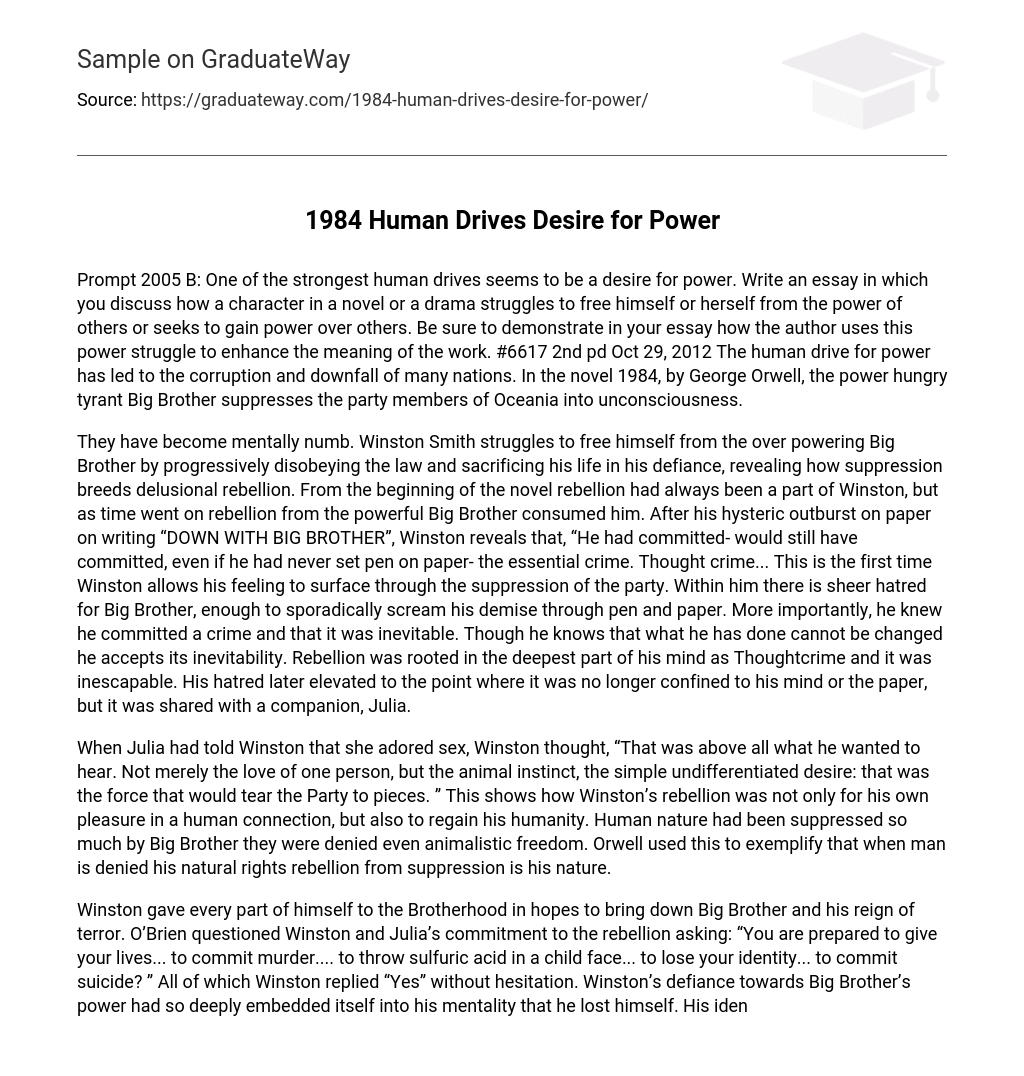Prompt 2005 B: One of the strongest human drives seems to be a desire for power. Write an essay in which you discuss how a character in a novel or a drama struggles to free himself or herself from the power of others or seeks to gain power over others. Be sure to demonstrate in your essay how the author uses this power struggle to enhance the meaning of the work. #6617 2nd pd Oct 29, 2012 The human drive for power has led to the corruption and downfall of many nations. In the novel 1984, by George Orwell, the power hungry tyrant Big Brother suppresses the party members of Oceania into unconsciousness.
They have become mentally numb. Winston Smith struggles to free himself from the over powering Big Brother by progressively disobeying the law and sacrificing his life in his defiance, revealing how suppression breeds delusional rebellion. From the beginning of the novel rebellion had always been a part of Winston, but as time went on rebellion from the powerful Big Brother consumed him. After his hysteric outburst on paper on writing “DOWN WITH BIG BROTHER”, Winston reveals that, “He had committed- would still have committed, even if he had never set pen on paper- the essential crime. Thought crime… This is the first time Winston allows his feeling to surface through the suppression of the party. Within him there is sheer hatred for Big Brother, enough to sporadically scream his demise through pen and paper. More importantly, he knew he committed a crime and that it was inevitable. Though he knows that what he has done cannot be changed he accepts its inevitability. Rebellion was rooted in the deepest part of his mind as Thoughtcrime and it was inescapable. His hatred later elevated to the point where it was no longer confined to his mind or the paper, but it was shared with a companion, Julia.
When Julia had told Winston that she adored sex, Winston thought, “That was above all what he wanted to hear. Not merely the love of one person, but the animal instinct, the simple undifferentiated desire: that was the force that would tear the Party to pieces. ” This shows how Winston’s rebellion was not only for his own pleasure in a human connection, but also to regain his humanity. Human nature had been suppressed so much by Big Brother they were denied even animalistic freedom. Orwell used this to exemplify that when man is denied his natural rights rebellion from suppression is his nature.
Winston gave every part of himself to the Brotherhood in hopes to bring down Big Brother and his reign of terror. O’Brien questioned Winston and Julia’s commitment to the rebellion asking: “You are prepared to give your lives… to commit murder…. to throw sulfuric acid in a child face… to lose your identity… to commit suicide? ” All of which Winston replied “Yes” without hesitation. Winston’s defiance towards Big Brother’s power had so deeply embedded itself into his mentality that he lost himself. His identity, his life, his whole existence were devoted to rebelling.
At this point he had lost all sight of the freedom he escaped for. Essentially, he escaped slavery from Big Brother to become a slave of the Brotherhood. He has become delusional for this rebellion which is inevitable in his downfall. Though rebellion is inevitable it is not always freeing. Big Brother’s over powering suppression made Winston thirst and completely submit to rebellion. He tried to free himself from the Party by breaking the law but by being consumed in the rebellion his freedom was disillusioned.





